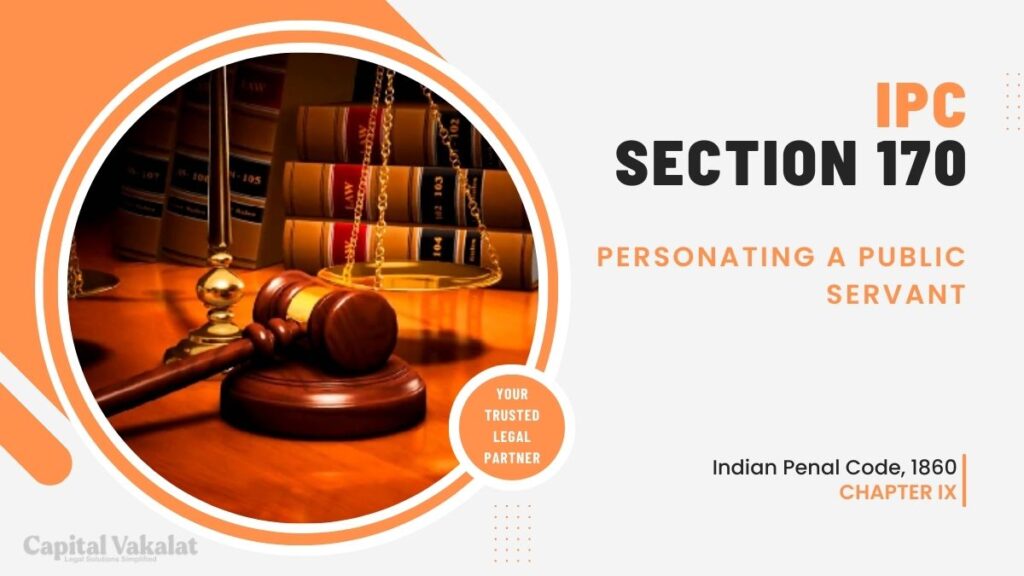Section 170 of the Indian Penal Code (IPC) deals with the crime of personating a public servant. This offense is taken seriously in India as it can have severe consequences for society and the credibility of public institutions.

In this article, we will explore the various aspects of Section 170 IPC, including its elements, punishments, and preventive measures.
Understanding Section 170 of the Indian Penal Code (IPC)
Section 170 IPC specifically addresses the act of personating a public servant. This involves pretending to be a government official or someone in a position of authority to deceive or manipulate others. The provision is in place to safeguard the trust people have in public servants and to prevent the abuse of power by imposters.
Elements of Offense
To convict an individual under Section 170, certain elements must be proven:
- Impersonation of a public servant.
- Intention to deceive.
- The use of this impersonation to gain an advantage or harm others.
Types of Public Servants
Public servants under this section include a wide range of individuals, such as police officers, government officials, judges, and even election officers. The law is comprehensive in its definition to cover all those who play a role in the proper functioning of the government.
Punishments Under Section 170 IPC
The punishment for personating a public servant is rigorous imprisonment, which may extend to two years or a fine, or both. These penalties aim to deter individuals from engaging in such fraudulent activities.
Notable Cases
There have been instances where individuals impersonated police officers to intimidate or extort money from innocent citizens. Such cases highlight the need for strict enforcement of Section 170 IPC to protect the public from such crimes.
Importance of Section 170 IPC
This section is vital in maintaining the integrity and trustworthiness of public institutions. By punishing those who impersonate public servants, it ensures that people can rely on genuine government officials and law enforcement agencies.
Preventing Impersonation of Public Servants
Preventing impersonation requires public awareness and vigilant communities. Citizens should be educated about the various roles of public servants and the importance of verifying their identities when necessary.
Reporting Cases of Impersonation
If you suspect someone of impersonating a public servant, it is crucial to report it to the nearest police station or authorities. Prompt reporting can prevent potential harm and bring offenders to justice.
The Role of Police and Investigation
Law enforcement agencies play a critical role in investigating cases of impersonation. They need to be swift in their actions to gather evidence and ensure a fair trial.
Legal Repercussions
The legal consequences for those found guilty of impersonation can be severe, including imprisonment and fines. This serves as a deterrent and emphasizes the seriousness of the offense.
Public Awareness Campaigns
Government and non-government organizations should work together to conduct public awareness campaigns regarding Section 170 IPC. These campaigns can educate people about their rights and responsibilities when dealing with public servants.
Conclusion
Section 170 IPC serves as a safeguard against the impersonation of public servants. By penalizing this offense, the Indian legal system aims to maintain public trust in government institutions and protect citizens from potential harm. Vigilance and prompt reporting of such cases are essential in upholding the law.
Frequently Asked Questions
Who can be considered a public servant under this section?
Public servants can include police officers, government officials, judges, and election officers, among others.
How can I report a case of impersonation of a public servant?
You should report such cases to the nearest police station or relevant authorities.
Why is Section 170 IPC important for society?
It is important for maintaining the trustworthiness of public institutions and protecting citizens from potential harm.
What are the key elements required to prove an offense under Section 170 IPC?
The key elements are impersonation of a public servant, intent to deceive, and using the impersonation for an advantage or harm.